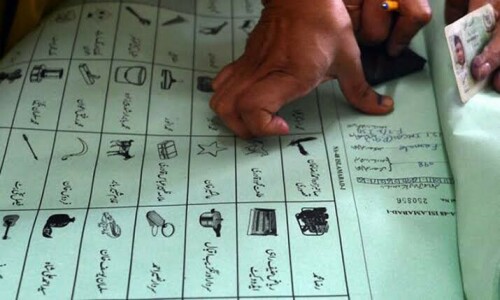• Forces kill 50 Palestinians in bombardments
• Yellen fears ‘humanitarian crisis’ if Tel Aviv cuts off crucial financing channel
GAZA STRIP: Israel launched devastating air strikes on Gaza early Thursday while also saying it is ready to resume stalled talks on a truce and prisoner release deal with Hamas to pause the war raging since October 7.
Israeli forces killed at least 50 Palestinians in aerial and ground bombardments across the Gaza Strip, health officials and Hamas media said.
The Gaza Strip’s civil defence agency said two pre-dawn air strikes had killed 26 people, including 15 children, in Gaza City alone. Agency spokesman Mahmud Bassal said one strike hit a family house, killing 16 people, in the Al-Daraj area, and another killed 10 people inside a mosque compound.
There was no immediate comment from the Israeli military.
Fierce street battles also raged in Gaza’s Jabalia and Rafah where the armed wings of Hamas and its ally Islamic Jihad said they had fired mortar barrages at Israeli troops.
International pressure for a ceasefire has mounted on Israel and its Prime Minister Benjamin Netanyahu as three European countries said on Wednesday they would recognise a Palestinian state.
Netanyahu vowed to continue fighting Hamas to “ensure what we have seen tonight never happens again”. But his office also said that the war cabinet had asked the Israeli negotiating team “to continue negotiations for the return of the hostages”.
The previous round of truce talks, involving the US, Egyptian and Qatari mediators, ended shortly after Israel launched its attack on Gaza’s far-southern city of Rafah early this month.
Israel went ahead with the assault on the last city in Gaza to be entered by its ground troops in defiance of global opposition, including from top ally the United States.
‘Humanitarian crisis’
Washington voiced concerns that about 1.4 million Palestinians who had been trapped in the city would be caught in the line of fire. Israel has since ordered mass evacuations from the city, and the UN says more than 800,000 people have fled.
US Treasury Secretary Janet Yellen warned on Thursday of the risk of a “humanitarian crisis” if Israel cuts off a crucial financing channel to Palestinian banks.
“I’m particularly concerned by Israel’s threats to take action that would lead to Palestinian banks being cut off from their Israeli correspondent banks,” she told reporters in Stresa in northern Italy, where a meeting of G7 finance ministers opens later.
“These banking channels are critical for processing transactions that enable almost $8 billion a year in imports from Israel, including electricity, water, fuel, and food, as well as facilitating almost $2bn a year in exports on which Palestinian livelihoods depend.”
Asked what the United States and G7 might do in response, Yellen said she had written to Israeli PM Netanyahu months ago about the economic situation in the occupied West Bank.
“And as I said, I believe it would create a humanitarian crisis in due course if Palestinian banks are cut off from Israeli correspondence,” she said.
Heavy fighting
Heavy fighting raged again in Gaza. Urban combat has also flared again in northern areas, including Jabalia, which Israeli forces first entered several months ago. Israel has also imposed a siege that has deprived Gaza’s 2.4m people of most clean water, food, medicines and fuel.
The sporadic arrival of aid by truck slowed further after Israeli forces took control of the Palestinian side of the Rafah border crossing with Egypt.
Jordan and others have airdropped relief goods into Gaza and some aid has been shipped in via a US-built pier, but many trucks have been quickly swarmed by desperate crowds.
Published in Dawn, May 24th, 2024












































Dear visitor, the comments section is undergoing an overhaul and will return soon.